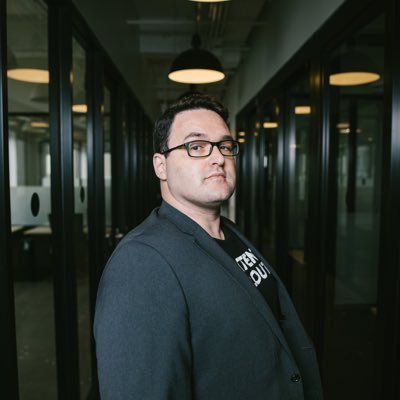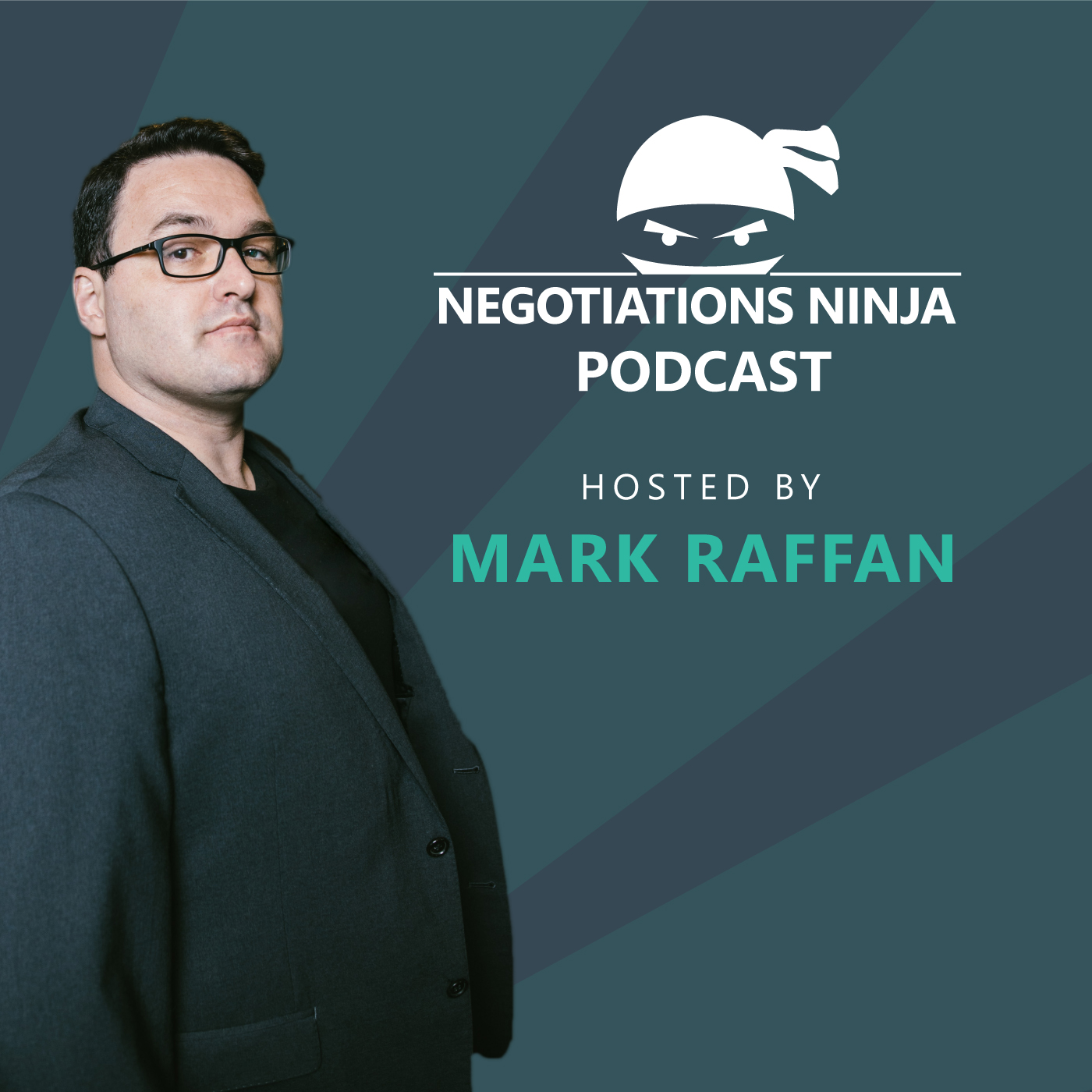Cross Over Episode: Tim Schigel on Negotiations Ninja with Mark Raffan
- 0.5
- 1
- 1.25
- 1.5
- 1.75
- 2
Mark Raffan: Welcome to the Negotiations Ninja Podcast, where we develop and deliver the most engaging negotiation content and training in the world. We host negotiation experts, business people, and entrepreneurs, and discuss what works, what doesn't work, and how we can improve our negotiation skills. Negotiations Ninja listeners, welcome. You've got Mark here today. Our guest is Tim Schigel. He's the managing partner at a company called Refinery Ventures. Refinery Ventures is all about investing in companies that are fast growth companies. And let me tell you, Tim knows a thing or two about that. If you've ever wondered what it's like to get inside the head of a guy that runs a very, very successful venture fund, who invests in fast growth companies, this is the episode that you need to listen to. We talk all about what the investors think about when they think about investing in fast growth companies, and companies in general. What goes on inside their heads? How are they deciding what to invest in, what not to invest in? What's their decision-making framework? All of that gets discussed in today's amazing episode with Mr. Tim Schigel. Tim Schigel, how are you?
Tim Schigel: I am terrific.
Mark Raffan: I'm very excited to have you on.
Tim Schigel: Can I say happy Friday? Or is this thing-
Mark Raffan: Happy Friday.
Tim Schigel: ...dislocated from the actual time?
I mean, listen, we record on Fridays. Hopefully, everyone knows that. But happy Friday, my friend. It's good to see you.
Tim Schigel: Yeah, same to you. It's been a good week.
Mark Raffan: It's been a fantastic week. Really, really good. Really productive on my end. How's it been on yours?
Tim Schigel: Very good. A lot of travel, actually.
Mark Raffan: Really?
Tim Schigel: Yeah. We had a niece who was having her third baby.
Mark Raffan: Amazing.
Tim Schigel: So we were in Phoenix, and just returned to Cincinnati the other night to a snow storm. Not that it was that much better in Phoenix. Scottsdale had snow, and it was kind of cold and rainy.
Mark Raffan: You're kidding. I don't know if I've ever heard of Scottsdale having snow. But that's pretty cool. That's pretty cool. Well, congratulations on the new addition to the family.
Tim Schigel: Yeah. Thank you.
Mark Raffan: That's fantastic. For the listeners who don't know who you are and what you do, maybe you could just give them a bit of background as to what you do.
Tim Schigel: Sure. So I'm the founding partner of Refinery Ventures in Cincinnati. We are an early stage venture capital firm started in 2017. So I considering myself, first and foremost, a tech entrepreneur. And I got into the venture business in'98. I was part of a venture firm that had 600 million under management. And then I ran a fund of funds investing in about 20 other venture firms. And most recently I've taken the culmination of a lot of that learning and experience, and wrapped it into Refinery.
Mark Raffan: Amazing. And that's why I'm so excited to have you on the show today because I really want to talk about sort of the negotiation process that comes up when it comes to investing. As a guy that sees a lot of deals, and I'm sure a lot of things come across your plate as potential opportunities, there's a thought process I'm sure that goes into how do you select an investment? How does that negotiation work? What are the dynamics like when you start talking about... And that's what we're going to be talking all about today. So I'm going to start off right away with a really open-ended question about when you're considering an investment and an opportunity comes across sort of your plate, what are some of the most challenging aspects that you think about when considering a potential opportunity?
Tim Schigel: Well, I'll answer that in the context of, or with the thought that the listeners are likely to be potentially entrepreneurs who need to raise money, and want to know how investors think. How's that?
Mark Raffan: Great idea.
Tim Schigel : Because I think there are some misconceptions. The venture industry's changed a lot in the last 20 years. It used to be fairly secretive and you didn't know what a term sheet looked like. And so, especially it was your first time raising money, you couldn't really anticipate what was coming your way, right? So how do you prepare for negotiation when you have no idea? And the other side has a lot more information than you do. And the veil was lifted on that because of the internet and the amount of information out there, and the National Venture Capital Association publishes a sort of standard term sheet. And so it's a lot easier now than it was 20 years ago or more to know, and to be educated, which is the first important thing. The second thing is to know that most investors have a specific stage or specialty in which they're investing, right? So we invest post-seed round, usually in companies that have raised less than three million that are around or approaching a million in revenue, that can scale to 10 million in 24 months or less. So sometimes that's called series A, sometimes that's called a seed plus. We don't really care what you call it. The point is we call it early scale. It's when you got product market fit, and you're trying to figure out the fundamental metrics to scaling. So that's our target range. We don't really try to vary too much from that. And because of that, we're very familiar with sort of the market and the benchmarks, and what the company needs to look like and what the expected valuations are going to be. Related to that, every fund likely has, as part of what's called its portfolio construction, they have a fund of a certain size. And they assume they're going to have a certain number of investments, say 20. In our case, it's more like 10. And they have a target ownership. At least if they're a good fund, they're going to have a target ownership. And they're going to understand that, look, if on average we get 15% or 20% of each of our companies, and any of those is a home run, it has a potential to return our fund. Meaning return the capital of the entire fund from one investment. That's the typical early stage venture model. That changes as you get into later stage in growth. So most of the investors you might talk to are going to have the target ownership, right? Another rule of thumb is that if you're raising money from the outside, you're probably looking at 20 to 30% dilution in each round. And usually, each subsequent rounds going to be, if you're doing well, 12 to 18 months after the prior round. And ideally, an increase in value of two to three times to maintain that 20 to 30% dilution. So it's actually a pretty simple model when you think about it. And it shouldn't be a surprise. But sometimes we'll come across an entrepreneur who thinks that their idea's super great. Which they do, of course they should. But they may not have been well-informed in terms of the market out there with venture. So they say, "Well, we have about a million dollars, but it's such a big idea that we want to raise money. And we think the pre-money of our company should be $50 million, and we want to raise a few million dollars." Well, the math falls apart in a lot of different ways, right? So it just doesn't match the market. And in some cases, those companies may, especially early, raise money from angel investors, non-institutional investors who aren't in the market as actively.
Mark Raffan: And they don't necessarily understand.
Tim Schigel: They don't understand. And then if they fall behind in their plan, they can find themselves in trouble because then they go to raise money from institutional, and they go, wait a minute, your cap table doesn't make any sense to me. And people get disappointed when they were really kind of telling themselves a lie at the beginning, right? So understanding where you fit in the market is really important. And it's so much easier to get that information nowadays. And to just ask the investors you talk to, that there shouldn't be too many surprises. And therefore the negotiation shouldn't be too hard.
Mark Raffan: Because you're coming in prepared, and you know what to expect, and what they're going to ask.
Tim Schigel: Yeah. And you've got a range. You kind of know the range you're in. And yeah, my recommendation first and foremost, as an entrepreneur, when I did my company, ShareThis, so ShareThis is the sharing tool you see all over the internet, right? So I raised series, today you'd call it a series A, then we may have called it a series B. We closed it on March 1st of 2008, which was like a week before the market fell apart. And we had zero revenue, but we had a lot of distribution, right? The ShareThis button was exploding all over the place. We raised $15 million on a $60 million valuation. That was insane. And the immediate thing I thought about people were like, "Oh that's great. Congrats." And I thought, well shoot. Now my post money valuation is 75, which means my investors are expecting to get a two or 3X step up in value before I raise money again, which is 150 or so. And I can't do that with zero revenue anymore, right? I'm going to have to bring it, if I'm going to make that. I would not do it again basically. The lesson from that is extremely hard. And I tell entrepreneurs all the time from that experience, look, you want a fair valuation. And if you have multiple potential investors, you'll get a fair valuation, right? That's the biggest thing that helps you get a market valuation. But first and foremost, choose an investor based on the quality of that investor, how they're going to help, your personal relationship with them, their track record of success. That's way more important than the valuation. Matter of fact, one of our portfolio companies recently just raised a very large round. And it was competitive, and a very good investor was bidding it up. And I told the CEO, I said, "Don't get greedy. This isn't the last round. This isn't where you're going to make your money. Which investor do you think is going to be better for the company?" And so we didn't take the highest valuation
Mark Raffan: Interesting. You chose based on the qualities of the investor that came in.
Tim Schigel: You need the market pressure? You need at least two companies to validate that kind of range. But again, this is not where you make your money, right? You make your money on the exit ultimately, not on that valuation. So make sure you have a couple of data points, but then pick the investor that's going to be the right investor for your company.
Mark Raffan: I want to talk about that for a second, because I feel like there's a common misconception because everyone gets dollar signs in their eyes, I find, when they're starting to talk about raising capital. When you're thinking about the qualities of an investor that you would potentially want to be in the mix, how should someone approach that? I know we talked about sort of track record, reputation, experience, what they bring to the table. So track record, for example, walk me through that. Why is that an important metric for someone who's seeking investment?
Tim Schigel: Easy answer is you want somebody with experience that has had a history of success. But to back it up a little bit and share an experience, when I was doing the fund to funds investing, it was with Cintrifuse in Cincinnati. And we were trying to create a venture ecosystem. And I did due diligence on well over 200 venture firms. And I also was working with a lot of the local entrepreneurs, and trying to help them matchmake. And what I discovered very quickly is they wanted introductions. And I would say, "Well, tell me, who's your top 10 list? Who do you want?" And immediately I started getting these lists that were just the brand name venture firms with no logic, other than they were just the brand named venture firms. And I pushed back immediately. I said, "Well, first of all, this is not my job to figure out who the best investors are. It's your job as the founder and the CEO to do your homework and to understand your competitors and the landscape. Who are the investors that have invested in," pick a category, supply chain like Tealbook, "Who are the investors historically that have invested or shown interest in supply chain. And then, which of the top companies do you admire? Who were their investors?" And then, go further. It's not about the firms, it's about the individuals. This is still a people business. And so who you get as a person, an individual, trumps everything, right? You can get the firm's name, but if you get somebody who is new to the firm, doesn't have the experience, doesn't really understand your business, that's not going to be as helpful. Not that they're terrible, but it's just not going to be what you really are aiming for. So as entrepreneurs asked for help in fundraising, that was a common kind of homework assignment I would give them to go do their homework. And what I noticed is when they do it and they do a good job, and they come to me with this new list, it makes the introductions that much easier. And what they find is they don't spend a lot of time educating the investors, what their business is, or the market, because the investors already know. So you can really get to kind of the meat of the situation quickly because you're not trying to convince them that, oh, mobile app usage is going to be a big deal, or the sharing economy is a big deal. And they're like, "Huh? I haven't heard of that." if that's the conversation you're having with investors, you're talking to the wrong people. They should have an appreciation and understand your market.
Mark Raffan: Yeah. So it's a big qualification process. And in the process of finding the right partner, you're also, when you're having these conversations, I'm trying to understand, at least for me from the outside end, it appears like you're trying to understand where you can get the best advice. Not only just a great investment, but also the best advisory capabilities of the investor.
Tim Schigel: For sure. That's way more important than the dollars. Money does not solve your problem, right? It just doesn't. And being in the Midwest, I see this a lot, particularly from family offices, which are people who've sold their businesses, or what have hundreds of millions of dollars potentially to invest in companies. And they start wanting to invest in potentially local companies and doing direct investments, and they can write big checks. And so they think, oh, we've put $10 or $20 million into this company. It should be successful. And they find out they're not. And it turns out they may not understand what other investors who do this for a living are looking for. They don't know what the metrics are, right? And they may have made their money in a traditional business, not necessary in the venture business so they don't understand the requirements for growth and hyper-growth. That it's more about growth and market share than it is profitability. And they don't have connections to other investors or the downstream investors. So they also may not be able to make introductions for you. So congrats, you've raised a lot of money. But if you don't translate that into execution, you're going to be in trouble. And some people do. It's not to say that that never works, right? Some people, their team may only need money. Thank you very much. I don't need any other help. But with my experiences, most of the time we all need help. Building companies is really hard, and you want the A Team at all times.
Mark Raffan: I can attest to that. Building companies is really, really hard. Okay. So we spoke about from the person who's looking for investors perspective, the entrepreneur's perspective. Now we sort of understand what to look for, how to look for it, how to do the research, to make sure that you're at least qualifying the list of people that you want to be able to speak to. From the investor's perspective, what qualities are you looking for in entrepreneurs? Not necessarily in the deal. Let's just say we hit all the metrics that you want to hit for the deal. But what are you looking for in terms of the quality of the entrepreneur?
Tim Schigel: Well, it would be nice, I mean, you can tell right away if they've done the homework and they understand the market and they've educated themselves. That becomes pretty apparent pretty quickly. And if somebody doesn't have that background, that's not the end of the world. I mean, you could have somebody who just does a brilliant job, really knows their customers, knows how to build a product. They just haven't had experience with this. That's okay. You can work with that if they're willing to take the help. But most of the time you're looking for somebody who kind of understands, this is our core hypothesis with Refinery. And the reason I created Refinery is that, what I found, and I've had an office in Silicon Valley for off and on for 30 years, right? So I'm very comfortable there. I've had a place to live out there. But I raised my family in Cincinnati. And there's a difference in the culture. And one of the key differences though, that was the a-ha for me, was very few of the entrepreneurs that I've talked to in the Midwest have ever worked in a company that had hyper-growth.
Mark Raffan: Interesting.
Tim Schigel: Whether that's zero to $10 million, or $10 to $100, or even $100 to billion, high growth is managed chaos. It's a very disruptive thing. And relatively small number of people have actually been in it. And you don't have to be the founder. I think that's the red herring. People, oh, they're looking for the repeat founders. Well, that's kind of a distraction. The person who was head of product, or a head of engineering, or head of marketing is the next founder. And if you're employee number 20 in a company that went from zero to $10 million in revenue in relatively short period of time, let me tell you, you learned a ton and you probably had to deliver a ton too otherwise you wouldn't have kept your job, right? So the quick stats are in Silicon Valley, roughly 35% of venture backed founders have prior hyper-growth experience. And places like Cincinnati, Ohio, it's like 5%. Matter of fact, not only do they not have experience, they don't know many people who've had that experience. So it's a big disadvantage. Doesn't mean you can't do it. It just sure helps to have the experience. And so even our name Refinery refers to how we are refined as leaders by going through that growth experience and overcoming adversity and learning how to grow through it. So it has all to do with leadership, and specifically that hyper-growth. So that's a big component that we look for, and we actively recruit people that are, I'll call them boomerangs. People that grew up in the Midwest or somewhere else. Maybe they were working in Silicon Valley for eight or 10 years, and then they want to move back. Those people have great experiences and really add a lot. And so we've seen that in our portfolio. And we're constantly reaching out to people with that kind of background and helping them plug into our network and to potential companies. It doesn't mean you have to be the founder. You can play another role in the company, but if you've had the hyper-growth, you're bringing a lot to the table. So that's a major component that we look for in the people.
Mark Raffan: Hey listeners. I want to tell you about another company that I run called Content Callout. It is a thought leadership brand marketing company. Now, what does that mean? It means that we take you, as an executive or entrepreneur, a leader of a small or medium sized business, and we turn you into a thought leader online. We take your personal brand and we amp it up to 11 so that you can lead with confidence knowing that people will recognize you, recognize your brand, and recognize your business because of the thought leadership approach that you've taken on social media through content creation and content distribution, as well as engaging with all of your following online. How do you get involved in this? Easy, easy, easy. Just go to contentcallout.com/getstarted, and you will see there three different options that will allow you to take your thought leadership brand for yourself and for your business to the next level. We are super excited to talk to you about this. We've seen some massive growth with the businesses that we've been working with. Very, very exciting time for us. Look at that. We appreciate it. Now back to your show. I think there's a misconception that exists potentially, not in the market itself that you play in, but outside of that, for people looking in that when, as the entrepreneurs raise money, that's when they're making their money. But that's not necessarily true, right? The goal, at least from the outside in, for me, is seeing a venture fund invest in a company, it has to be a symbiotic relationship. Because they're both going to make money on the exit. And so the idea at least is to help that company to grow as much as possible, as fast as possible to be able to get that exit. But for whatever reason, there seems to be this idea that, hey, you raised $15 million, $20 million. Congratulations. You've made a ton of money. That's not true.
Tim Schigel: Right. As we mentioned earlier, building companies is very hard, and it takes a lot of time. The average venture invested company takes six or seven years before an exit. And that's if it's a good one. There are plenty of others that take a lot longer if you can get an exit, and there's no guarantee you'll get an exit. Because it's not like the stock market. If you do not generate high growth, and you're of a certain size, there may not be any buyers for what you have, right? So the exit is not guaranteed in the least. And if you look at venture overall, and how much money is invested into companies, it's the power law. You invest in 100, and only one has to make it and have a big return and it accounts for 99 losses. So the chances of success are very low, but it's a long process. And so we celebrate it when we do raise money. It's worth celebrating, right? It's a major milestone. It's a major validation of what you're doing. So it should be. But the entrepreneurs should also not let themselves be fooled. Don't believe your own press. Everybody wants to celebrate with you, right? Your whole city says, "Great, you've just raised $10 million or $15 million. This is great. This is great." Only to find out several months later, you're out of business, right? You just don't want that to happen. And we have to be reminded that there's a cost to that money, right? There's always a cost to that money. It's not free money. The best type of investment is customer revenue, right? If you can get customers and not have to raise money, that's the best situation. Matter of fact, there's something like 38 to 40 companies that we would know that are unicorns, that didn't raise any outside money. One of them top of mind is MailChimp. So it can be done. You don't have to raise a bunch of money, right? Matter of fact, the more capital efficient you are, the better. And oftentimes you'll hear entrepreneurs say, "Well I should be able to raise $5 million because this company and this company and this company raised $10 million or $15 or $20. My idea is similar so I should be able to raise that much money." And what they don't understand is they raised that money because they could, not because they had to, right? So I developed, I call this now the first law, which is capital follows growth, right? In the seed round, not necessarily. You get friends and family, whoever, to fund your great idea and the fact that you're a great entrepreneur. But not too long after that, people are looking for metrics. And if you have good metrics and if you're capital efficient, you'll find it's really easy to raise money. Rarely had a hard time raising money. Because I knew it was about the metrics. I used to, when I was working with the entrepreneurs in Cintrifuse, I kind of used this story, and it was almost true. A little bit of hyperbole, but almost true. I could call an investor on a coast and walk them through the metrics of a company that are growing quickly. And they will be on a plane the next day to any city in the country to check out that company. The next day. Still not know what the company does. And that's almost not true. I mean, it's so close to that. Because as investors, we see a lot. I'll see 1,000 business plans a year. There's definitely pattern recognition, right? And when you see hockey stick happening, you notice it. It's becomes apparent. It's not just an idea anymore. It's a hockey stick. Matter of fact, if you want to have a conversation with an investor, they're not listening to anything you say until you qualify yourself by talking about your numbers. If you can show a steady acceleration of sales, month by month, or quarter by quarter, or week by week, that just gets you in the game. Now they're going, "Okay, now you're a genius." But if I try to convince you I'm a genius without telling you the numbers, I may not even listen. It's just how we're wired. So back to the original question, don't get too distracted, don't believe your own press in terms of raising the money. Your execution and your growth have to support the fact that those investors are going to expect an up round from you in certainly less than 24 months. And if you fall behind on that what has to happen? They have to go back to their investors and explain why that company is underperforming. You just don't want to be in that situation, right? So you have to think and have this hyper-growth mindset from the start. And each round, understand what the risks are, what the unknowns are, and how that new investor's going to help you ensure that you overcome those risks or fill those gaps before the next round.
Mark Raffan: Let's say, for example, the entrepreneur, a founder or a group of founders, is presented with a term sheet from a group. And they may be playing with a couple of different offers. They like an offer from venture fund that may not necessarily be the highest valuation, similar situation to what we were talking about earlier. How does that negotiation then work afterwards to potentially increase the valuation with that company? Or where does that conversation go from there?
Tim Schigel: Well first of all, it depends on what the gap is obviously. And it depends on the context in terms of other things that you may be negotiating. So there could be other aspects of the investment that are more important than the valuation. But let's just say for argument's sake, for purposes of your question, that the terms are the same, but there's a relatively large gap between the value. Let's say 20% cap. You go back to the investor that might be below, and you have a transparent, good faith conversation. And say, "Look, I've got other interest. It's my duty fiduciary as the CEO and the board to make sure that we take a good offer and a fair offer. And we believe this higher offer is fair, and that you're slightly below. And we'd like to close the gap.
Mark Raffan: Because we want to work with you. So you basically-
Tim Schigel: We want to work with you. So help us make it happen." Now if you're asking them to stretch, because you got a term sheet from somebody at a higher valuation that you know is sort of obscene, or is likely to be potentially out of market, you may decide that you don't need to push. That the better investor's offer is in the right range, and it's not worth it to the relationship, et cetera, to push. So that's a judgment call, for sure. And if you're lucky enough to have multiple interested parties, you'll have a good sense of what the right number is. Matter of fact, there's also a case I'm thinking of where the current investors, a company's doing a series C, and one of the investors that was in the B round did not lead it. They like to do later rounds. So they came into the B. They wanted to step up and do the C and price the company. Well, it's kind of tricky because they're an insider. And so the CEO needed to talk to the market a little bit to get a sense for what the right valuation was to ultimately get a term sheet from the group that already knew them.
Mark Raffan: Put a little bit of pressure on.
Tim Schigel: A little bit of pressure. Again, not in a cutesy way, but just to say, "Hey, what would we be valued at?" Let's say we went out and we felt like existing investor kind of would love to put the money in at a $100 million dollar valuation, and just jam it in. And you're like, yeah, we probably get 150 if we were out in the market so let's talk to a couple of people. But then ultimately going out and raising money is a unproductive activity. It's better to be building the business. So if you could split the baby, as it were, and say, look, let's find a happy compromise, and let's get this done sooner. Instead of having a bunch of meetings with people that are likely not going to be able to invest anyway, then come up with a fair compromise and move on. Don't over-optimize or try to over tailor these things because time also matters.
Mark Raffan: The time that you're spending on raising money versus the time that you're spending on building the business, you mean?
Tim Schigel: Right. And it could be a distraction for the entire team, et cetera, et cetera. Now potential new investors might be bringing something else new to the table. That might be a factor too. It may not solely be about valuation. So you have to make that assessment based on what you think you need for the company. But the point is sometimes you do need to kind of test the market to make sure that you understand where the benchmark is and what would be "fair."
Mark Raffan: Fascinating. This has been a super fascinating conversation, Tim. If you were going to leave the listeners today with a single piece of advice, they're potential entrepreneurs or entrepreneurs that are looking to raise money potentially, what's the last piece of advice that you would leave them?
Tim Schigel: So two things. One have a process so that you have alternatives. You have multiple potential parties.
Mark Raffan: So important. Yeah.
Tim Schigel: People after the fact do the analytics to figure out, oh, you were bought or acquired for X multiple, or Y multiple of revenue or EBITDA or whatever. Well, those calculations are oftentimes, especially in venture, calculated after the fact, right? The valuation, if it's a good one, is usually driven by some sort of auction or bidding war where people are pushed to make sure you get the right valuation for your shareholders. So that's the first one. The second one that's extremely important is listening. Both for the investor on the entrepreneur to understand what the investor's goals are. Help me understand what are you trying to do with this investment? What do you want to see us do as a company after this round? What are you trying to get out of this? And have the discussion on the term sheet kind of based on first principles. This is why this term is important. This is why this term is important. This is why this term's not important. Versus just trying to sort of horse trade with features, just to optimize for the best features. Why are each of these things important? How does it relate to the business and what you're trying to achieve? And if you aren't sure, you haven't done it, make sure you have board members or advisors or somebody who has that you can bounce off of and take time during the negotiation to think it through.
Mark Raffan: I love that. I think that for me is the most critical piece of advice because I think there's so many entrepreneurs that haven't done this before, right? I mean, if you're going to raise money, there's a high likelihood that you may not have raised money before. And so you're so new to the game that you don't know. You just don't know what you don't know. And so getting that advice and having someone in your corner who you can lean on to say, "Okay, what should I do here? I have no idea what I'm doing." That's a very, very important step. And I think a lot of people let their pride get in the way of having those really open and honest conversations. And I think that pride, that ego can be a really challenging thing to overcome for a lot of people.
Tim Schigel: Yeah. And unfortunately, the venture industry has had a bad history of somewhat aggressive or not honest brokers, if you will, that like to have that information advantage. That's not how I roll. I think the more educated you are, the better. We're going to have to work together. I don't need to use that some advantage. I'd rather convince you why I'm a good investor and partner for you, and have you make a good business decision with eyes wide open and informed. And so I'll encourage an entrepreneur to go, "I hope you do talk to so- and- so," or this other CEO, or some other venture firm," and I'll stand by what I think I'm bringing to the table. And then ultimately, if you honestly conclude that somebody else brings something better, "and that happens, right" or maybe they don't bring something better, you just opted to optimize for valuation," God bless. Just good luck and sorry about my luck." But I will make an aggressive, but honest and transparent case, if we're really interested in the company, of why we should invest and why the valuation is what it is. And I think ultimately people respect that. You're in an industry and a business where you have to take the long view, right? Both with entrepreneurs, as well as with other co-investors because sometimes you're competing with other investors and sometimes you're co-investing with them. And so if you have a reputation for elbows being a little too sharp, you may find you're not getting a lot of friends standing around helping you out.
Mark Raffan: Yeah. And then the future deal flow doesn't look quite as good.
Tim Schigel: Right.
Mark Raffan: Interesting. Yeah. Look, I think it's so interesting to hear you talk about this because it's very clear that you have a very disciplined approach to how you invest in companies, how you invest in entrepreneurs. You've got a lot of things already set up. The model is set up. And so you're very clear about what deals you'll even look at versus what deals you won't look at. From the entrepreneur's perspective, I think that's a lesson that entrepreneurs need to take out of this, is if you're going to go and seek money, you've got to be very clear about what you need and what you want. Not only from the money perspective, but from the advisory perspective, who you want to work with, how you want to work with them. And that discipline process, I don't think is as rigorous in sort of the people who want to raise the money versus the people who are investing the money. So I think one thing that I'd like the listeners to take away from this is how disciplined Tim is to his approach to investing. We as entrepreneurs need to be equally as disciplined when we go out and seek capital because that is when good relationships occur and that's when great things can happen.
Tim Schigel: Absolutely. And then entrepreneurs tend to feel sort of maybe intimidated by the people that have the money. And it's better to think of them as service providers to you. Which is what we are. We're there to support the entrepreneur. And if you get that mindset, it'll change the dynamic. I guarantee it.
Mark Raffan: Absolutely fascinating conversation. Tim, if people want to reach out to you, how did they do that?
Tim Schigel: Tim@refinery. com. And Twitter's just @Schigel, S- C- H- I- G- E- L or @RefineryVC.
Mark Raffan: Awesome. For the listeners, just so that you know, we're going to link out to all of that in the show notes. We will also link out to Refinery Ventures' website, as well as Tim's profiles socially. Tim, thank you so much for being on and sharing your wisdom.
Tim Schigel: Thank you. Thanks for having me on.
Mark Raffan: Hey friends, thanks so much for listening to this episode. If enjoyed it, please share it with friends and colleagues so that they can benefit from it as well. If you find Negotiations Ninja podcast worthy, please go on to iTunes and give us a cool rating with a nice review. We certainly appreciate every single one that we get because it helps us to understand who is listening, how they're listening, and what it is they like. If there's something that you would like me to discuss around negotiation influence or persuasion, give me a shout. You know how to reach me on social media, or you can get me on my website, which www.negotiations.ninja.
DESCRIPTION
Check out our friend, Mark Raffan's podcast, Negotiations Ninja. Episode #197 is from our very own host at Fast Frontiers. Please enjoy listening to: Inside the mind of venture capitalist Tim Schigel
Today's Host

Tim Schigel
Today's Guests








